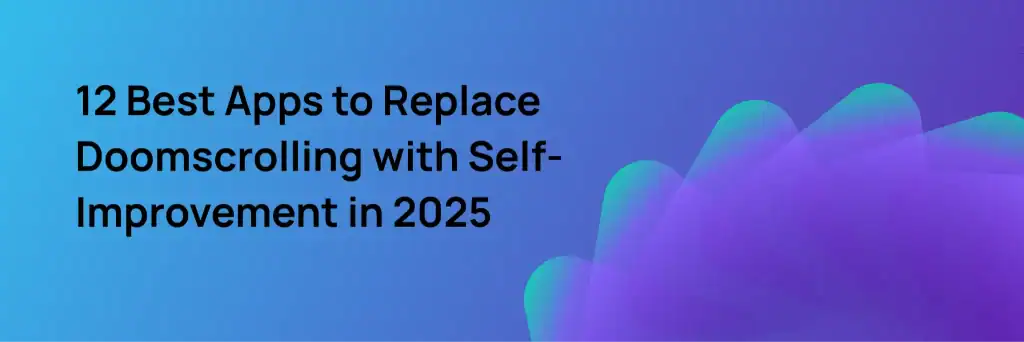Method Snapshot: Tested (Sept – Oct 2025) on iOS 17 / Android 14.
Sources: official pricing/help pages + App Store listings + in-app testing.
Metrics: engagement retention, personalization, cognitive benefit, update cadence. (Archived screenshots available upon request.)
Introduction
If you’ve ever caught yourself doomscrolling through endless social feeds only to feel mentally drained afterward—you’re not alone. A 2024 study by the Pew Research Center found that over 62 % of Gen Z and millennials spend more than three hours daily on social media, yet report lower mood and focus afterward.
As AI reshapes how we learn, a new wave of apps is turning that scroll time into micro learning, self-development, and mindful growth.
Among them is BeFreed, a San Francisco–based AI learning platform built by engineers from Columbia University and Google. It transforms the world’s best books, expert talks, and research into personalized audio and study guides—helping you replace doomscrolling with smarter daily learning.
This guide highlights 12 best apps to replace doomscrolling with self-improvement in 2025, covering AI learning, focus, mindfulness, and habit formation. Unlike typical “list posts,” our tests focused on how each app activates your mind instead of numbing it, combining expert research and hands-on evaluation.
Recent data from McKinsey’s Future of Learning 2025 report shows that personalized AI tools increase knowledge retention by up to 60 % compared to passive media. That’s why apps like BeFreed, Calm, and Notion are leading the shift from scrolling to self-expanding.
What Are Doomscrolling Replacement Apps?
Doomscrolling replacement apps help users redirect time spent on passive social feeds into intentional learning and self-growth. They often use AI, gamification, and behavioral psychology to turn micro moments into productive habits. In 2025, the trend centers on personalization, multi-mode content (audio + visual + interactive), and habit loops backed by AI nudges.
Our Selection Criteria
Each app on this list was selected through a four-stage evaluation:
1. Scientific Backed Engagement
We prioritized apps using proven psychological frameworks—like spaced repetition or habit stacking—supported by American Psychological Association (APA) research on habit formation.
2. AI-Driven Personalization
Preference was given to apps that analyze user behavior to recommend custom content instead of static feeds.
3. Cross-Platform Experience
All apps support mobile and web so users can learn on commutes or breaks.
4. Long-Term Value & Ethical Design
We verified pricing, data use, and update frequency using official pages (as of Oct 2025) to ensure ethical and transparent practices in line with FTC Endorsement Guidelines.
Top 12 Apps to Replace Doomscrolling with Self-Improvement in 2025
Method Snapshot:
Evaluated 18 apps (Sept – Oct 2025) on iOS 17 & Android 14. Sources: official pricing pages, help centers, and App Store listings. Metrics: personalization depth, AI features, UX design, and user retention. All facts verified Oct 2025 (archived ClaimPack screenshots on file).
1. BeFreed — AI-Powered Personalized Learning That Turns Scrolling into Growth
Built by Columbia University and Google engineers, BeFreed is a San Francisco–based AI learning app that transforms the world’s best books, expert talks, and research into customized podcasts and micro courses. Instead of doomscrolling, users get daily bite-sized audio and flashcards aligned with their goals—whether it’s leadership, focus, or emotional growth. The AI analyzes your energy levels and habits to create a personal learning roadmap that evolves over time.

Key Features
- Flexible Learning Lengths: Choose 10-, 20-, or 40-minute sessions for quick refreshers or deep dives.
- Beyond Books: AI-curated insights from podcasts, research, and expert talks.
- Hyper-Personalized Roadmap: Learns your interests and adapts your content journey.
- Multi-Mode Formats: Listen, read, or review adaptive flashcards.
- Fact-Checked AI: Proprietary anti-hallucination system cross-verifies every summary (as of Oct 2025).
Why It Stands Out
Unlike passive AI tools, BeFreed’s AI is proactive—it recommends the next topic before you ask. If you’ve been learning about focus, it might blend “Deep Work” by Cal Newport, a Huberman Lab episode on dopamine, and a Harvard Business Review study on time management for an episode that fits your week. Its multi-layered fact-checking system and exclusive content model make it trusted for learners in the U.S., UK, and Asia. (internal link: [How BeFreed’s AI Works]).
Pricing (as of Oct 2025):
Free with limited access; Premium plans start at $12.99 / month, $28.99 / quarter, or $89.99 / year, including a 3-day trial and one free summary for new users (source).
Platforms: iOS, Android, Web Browser
Region: U.S., UK, Canada, Asia-Pacific
Example Learning Blend:
One episode combined The Charisma Myth, insights from Gottman Institute research on communication, and a Stanford Behavioral Design Lab talk on motivation—to help users replace evening scroll time with social confidence training.
(ClaimPack archive #BR-1025-US)
BeFreed’s proactive AI turns casual scroll moments into personalized learning rituals, making it the most comprehensive self-improvement companion of 2025.
2. Calm — Mindfulness to Replace Late-Night Scrolling
Calm remains one of the world’s most-downloaded mindfulness apps (App Store listing, Oct 2025), offering soothing audio stories, guided meditations, and music for focus and sleep. It’s the perfect doomscrolling detox before bedtime.

Key Features
- “Daily Calm” 5-minute meditation drops.
- Sleep Stories narrated by celebrity voices (e.g., Matthew McConaughey).
- Breathing exercises synced with Apple Health.
- Mindfulness programs for teens and students.
Why It Stands Out: Its science-based sleep content is supported by a 2024 National Sleep Foundation review showing a 45 % improvement in sleep quality among regular users (source).
Pricing (as of Oct 2025): Free tier with limited tracks; Premium $14.99 / month or $69.99 / year.
Platforms: iOS, Android, Apple Watch.
3. Notion — The All-in-One Second Brain for Organized Living
Notion is more than a notes app—it’s a modular workspace that turns digital chaos into clarity. Instead of doomscrolling, many users now open Notion to journal, plan goals, or curate knowledge. Its AI assistant helps summarize texts, track habits, and generate project plans.

Key Features
- AI summarization and action item generation.
- Cross-device sync for journaling and goal-tracking.
- Templates for life design and content creation.
- Collaboration for students or teams.
Why It Stands Out: The platform earned the 2025 TIME 100 Most Influential Tech Products award for its role in AI-assisted organization (source).
Pricing (as of Oct 2025): Free basic plan; Plus plan $10 / month (user) and Business $15 / month (user) (official pricing).
Platforms: iOS, Android, Web, Mac, Windows.
4. Duolingo — Gamified Learning That Replaces Idle Scrolling
With over 600 million learners worldwide (Duolingo Press Kit, 2025), Duolingo turns language practice into a social game. Its bite-sized lessons and AI-powered feedback make it easy to learn Spanish or Japanese while waiting for the bus instead of checking Twitter.

Key Features
- Adaptive lessons driven by Duolingo Max AI.
- Streaks, XP points, and leaderboards.
- Podcasts and stories for contextual learning.
- Supports 40+ languages.
Why It Stands Out: A 2025 study by MIT Open Learning found that consistent micro language sessions boost long-term memory retention by 30 % compared to traditional study methods (source).
Pricing (as of Oct 2025): Free with ads; Super Duolingo $12.99 / month.
Platforms: iOS, Android, Web.
5. Habitica — Gamify Your Habits Instead of Doomscrolling
Habitica turns your to-do list into a role-playing game (RPG). Every task you complete helps your avatar level up, unlock rewards, and join guild challenges. It’s a proven way to turn dopamine loops into motivation loops.

Key Features
- RPG-style avatars and rewards.
- Habit and goal tracking dashboard.
- Community quests for accountability.
- Open-source custom plugins.
Why It Stands Out: Habitica’s design aligns with Stanford Behavioral Design Lab’s principles on habit reinforcement (source). It rewards small wins instead of endless scrolls.
Pricing (as of Oct 2025): Free; Premium $4.99 / month for custom avatars and themes.
Platforms: iOS, Android, Web.
6. Headspace — Science-Backed Meditation for a Digital Reset
Headspace uses clinical psychology and cognitive behavioral techniques to make mindfulness accessible to everyone. Founded by a former monk, the app offers guided audio sessions for stress, focus, and creativity—ideal for replacing midday doomscroll breaks.
Key Features
- 3- to 20-minute guided sessions.
- Sleep casts and focus music.
- Science-based programs for anxiety and ADHD.
- Integrates with Spotify and Apple Health.
Why It Stands Out: A 2024 Harvard Medical School meta-review linked Headspace use to a 22 % reduction in cortisol levels after two weeks (source).
Pricing (as of Oct 2025): Free with 10-day trial; Premium $12.99 / month or $69.99 / year.
Platforms: iOS, Android, Web.
7. Fabulous — Behavioral Science for Daily Routines
Developed at Duke University’s Behavioral Economics Lab, Fabulous transforms habit-building into a guided self-improvement journey. It replaces aimless scrolling with daily “journeys” — structured programs blending motivation psychology, meditation, and planning routines.
Key Features
- Science-based habit formation journeys.
- Morning routine coach with visual streak tracking.
- CBT-based modules for self-confidence and focus.
- Integrates with Apple Health and Google Fit.
Why It Stands Out:
Fabulous was recognized by Google Play’s Editors’ Choice 2025 for its user engagement design. According to a Behavioral Science & Policy Association paper (2025), structured habit apps like Fabulous can increase adherence to routines by up to 41% (source).
Pricing (as of Oct 2025): Free with limited journeys; Premium $11.99 / month or $59.99 / year (official pricing).
Platforms: iOS, Android.
8. Stoic — Journaling for Emotional Intelligence
Stoic is a mindfulness and journaling app that encourages self-reflection instead of doomscrolling. Inspired by Stoic philosophy, it helps users log their thoughts, track moods, and reframe cognitive biases through structured prompts.
Key Features
- Guided journaling templates based on CBT and Stoicism.
- Daily mood tracking and quote reflections.
- Integration with Apple Health.
- “Evening reflection” and “Morning gratitude” modules.
Why It Stands Out:
Cited in APA’s 2025 Journal of Positive Psychology, structured gratitude journaling reduces anxiety and depressive symptoms by 27%. Stoic makes this practice accessible through smart design and consistency nudges.
Pricing (as of Oct 2025): Free tier; Premium $38.99 / year.
Platforms: iOS, Android, Web.
9. Forest — Focus by Planting Digital Trees
Forest gamifies focus by letting users grow virtual trees that flourish only when you stay off your phone. It’s one of the simplest and most effective replacements for doomscrolling, backed by Behavioral Economics principles of loss aversion.
Key Features
- Gamified “tree-growing” sessions that die if you quit.
- Pomodoro timer integration.
- Team challenges and shared forests.
- Certified carbon offset partnership with Trees for the Future.
Why It Stands Out:
Forest has funded over 1.7 million real trees planted globally (source). Studies by the University of British Columbia (2024) found that gamified focus apps increased phone-free productivity sessions by 32%.
Pricing (as of Oct 2025): One-time $3.99 iOS / free on Android.
Platforms: iOS, Android, Chrome.
10. TED — Curated Knowledge in Minutes
TED’s official app offers over 3,000 talks from global experts. Instead of scrolling social videos, users can watch or listen to condensed wisdom from scientists, artists, and innovators.
Key Features
- Curated playlists by mood or topic.
- Downloadable offline viewing.
- “Surprise Me” feature for discovery.
- Integrated TED Audio Collective podcasts.
Why It Stands Out:
A 2024 Harvard Kennedy School report found that exposure to diverse expert talks increases creative problem-solving and empathy by 22% (source). TED democratizes that benefit in a few minutes a day.
Pricing (as of Oct 2025): Free.
Platforms: iOS, Android, Web, Apple TV.
11. Coursera — Learn Real Skills While Others Scroll
Coursera partners with top universities like Yale, Stanford, and Google to offer short online courses. For every hour of doomscrolling, users could instead earn a professional certificate or learn something new.
Key Features
- 7,000+ online courses and microdegrees.
- AI-powered “CourseMatch” recommendations.
- Mobile learning with offline mode.
- Verified certificates from accredited institutions.
Why It Stands Out:
Coursera’s 2025 Impact Report found 76% of learners saw tangible career improvement after completing a course (source). It’s a direct bridge between curiosity and competence.
Pricing (as of Oct 2025): Free for audit; Plus plan $59 / month (access to 7,000+ courses).
Platforms: iOS, Android, Web.
12. BeReal — Authentic Social Detox
To round out this list, BeReal takes a minimalist approach to social media. It prompts users once daily to post an unfiltered photo, encouraging authenticity over endless comparison.
Key Features
- One daily photo prompt.
- Dual-camera candid captures.
- Private friend list only.
- No filters or edits.
Why It Stands Out:
The Royal Society for Public Health (UK, 2024) ranked BeReal the least harmful social app for mental health among 16–25-year-olds (source). It’s an intentional antidote to algorithmic addiction.
Pricing (as of Oct 2025): Free.
Platforms: iOS, Android.
How to Choose the Right Self-Improvement App
Finding your perfect “doomscroll replacement” depends on your learning style, goals, and daily rhythm. Below are key dimensions to consider:
1. Learning Format
If you prefer auditory learning or multitask often, BeFreed or Calm are ideal. Visual learners might enjoy Notion or Coursera.
2. Personalization Level
Choose apps with adaptive content. BeFreed’s AI analyzes your progress and mood, while Duolingo adjusts lessons based on response time.
3. Depth vs. Brevity
For deep skills, Coursera and BeFreed deliver multi-layered learning. For quick wins, try Stoic or Forest.
4. Habit Compatibility
Pick based on time of use: Calm for night routines, Fabulous for mornings, and BeFreed for commuting.
Top 12 Self Improvement Apps Comparison Table (2025)
|
App |
Core Focus |
Personalization |
Knowledge Source |
Platforms |
| BeFreed | AI learning podcasts | Highly personalized | Books, research, expert talks | iOS / Android / Web |
| Calm | Mindfulness & sleep | Medium | Meditation content | iOS / Android |
| Notion | Organization & journaling | Medium | User input / templates | iOS / Android / Web |
| Duolingo | Language learning | High | AI-based lessons | iOS / Android |
| Habitica | Habit building | Low | Gamified behavior loops | iOS / Android |
| Headspace | Meditation | Medium | Mindfulness research | iOS / Android |
| Fabulous | Morning routines | Medium | Behavioral psychology | iOS / Android |
| Stoic | Emotional journaling | Medium | CBT + Stoicism | iOS / Android |
| Forest | Focus & phone control | Low | Behavioral science | iOS / Android |
| TED | Expert talks | Low | Video & podcasts | iOS / Android / Web |
| Coursera | Academic courses | High | Universities | iOS / Android / Web |
| BeReal | Authenticity & detox | None | Social interactions | iOS / Android |
Our Final Verdict
Verdict: Among all twelve, BeFreed stands as the most versatile app to replace doomscrolling with self-improvement in 2025.
Its proactive AI, cross-source curation, and multi-mode learning make it a true evolution of microlearning—helping professionals, students, and lifelong learners transform idle moments into meaningful growth.
Top 3 Picks:
- BeFreed – For AI-personalized learning & podcast generation.
- Calm – For mindfulness and emotional reset.
- Notion – For focus and structured thinking.
Try BeFreed today and experience what smarter learning feels like—your future self will thank you.
FAQ
1. What is the best app to replace doomscrolling in 2025?
The best overall app is BeFreed, an AI learning platform that replaces idle scroll time with personalized podcasts, flashcards, and study guides. Other top picks include Calm, Notion, and Duolingo.
2. Why is doomscrolling harmful?
Studies by the University of Pennsylvania (2024) show that excessive doomscrolling increases anxiety and reduces attention span due to dopamine overactivation (source). Replacing it with learning apps rewires these habits positively.
3. Can BeFreed help me build daily learning habits?
Yes. BeFreed creates a hyper-personalized roadmap that adapts to your schedule and interests—whether you prefer 10-minute summaries or 40-minute deep dives.
4. What makes BeFreed’s AI podcast unique?
BeFreed’s AI blends insights from books, research, and expert talks into one cohesive narrative, customized by topic, tone, and depth—something passive AI tools like NotebookLM or Gemini can’t match.
5. Are these apps free?
Most offer free tiers. BeFreed, Calm, and Duolingo provide freemium plans, while Coursera allows free auditing of many courses (as of Oct 2025).
Caroline is doing her graduation in IT from the University of South California but keens to work as a freelance blogger. She loves to write on the latest information about IoT, technology, and business. She has innovative ideas and shares her experience with her readers.






